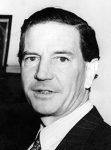 Kim Philby (1912-1988) was a British intelligence officer who was exposed as a Soviet double agent in the 1960s. He later vanished and defected to the Soviet Union. Harold Philby was born in India, the son of noted British explorer John Philby. His exotic upbringing earned Philby the childhood nickname “Kim” from the Rudyard Kipling character. He was educated at the Westminster School and Cambridge, where he graduated with a degree in history in 1932. While at university Philby became acquainted with several other future spies, including Anthony Blunt, Guy Burgess, Donald Maclean and John Cairncross. Together they became known as the Cambridge Five spy ring. Philby, who was recruited by Soviet spotters at Cambridge and confirmed as an agent in 1933, was by far the most active of the five.
Kim Philby (1912-1988) was a British intelligence officer who was exposed as a Soviet double agent in the 1960s. He later vanished and defected to the Soviet Union. Harold Philby was born in India, the son of noted British explorer John Philby. His exotic upbringing earned Philby the childhood nickname “Kim” from the Rudyard Kipling character. He was educated at the Westminster School and Cambridge, where he graduated with a degree in history in 1932. While at university Philby became acquainted with several other future spies, including Anthony Blunt, Guy Burgess, Donald Maclean and John Cairncross. Together they became known as the Cambridge Five spy ring. Philby, who was recruited by Soviet spotters at Cambridge and confirmed as an agent in 1933, was by far the most active of the five.
After leaving Cambridge, Philby studied Russian while working as a journalist and editor. In 1937-38 he worked in Spain as a correspondent for the London Times; while in Spain Philby forged links with the fascist Nationalists. Philby was recruited by MI6, the British Secret Intelligence Service, shortly after the outbreak of World War II. During the war, he headed the counter-intelligence department and unearthed some crucial information about Germany’s war plans. Philby passed this information, along with British war secrets, to his Soviet handlers. After the war, Philby headed British intelligence in Turkey before being posted to the British embassy in Washington DC. In 1950 he came under growing suspicion, largely due to information provided by Soviet defectors. Philby was recalled to London and pressured to resign from MI6, which he did in July 1951. He returned to journalism but found it difficult to obtain work, while his Soviet handlers lost interest in him. Philby was investigated and cleared in 1955 – but more Soviet defections in 1961 threatened to blow his cover.
In January 1963 Philby vanished while working in Beirut, Lebanon. It later emerged that Philby had boarded a Soviet cargo ship to Moscow, where he announced his defection and was feted as a hero. Philby lived out his days in the Soviet Union, writing his memoirs, providing occasional advice to the KGB and collecting a small government pension. His wife joined him in Moscow in 1964 but left a year later; he later married a young Russian writer. In 1968 Philby published his memoirs, My Silent War. He died in Moscow in May 1988.
Content on this page is © Alpha History 2018-23. This content may not be republished or distributed without permission. For more information please refer to our Terms of Use.
This page was written by Jennifer Llewellyn and Steve Thompson. To reference this page, use the following citation:
J. Llewellyn & S. Thompson, “Kim Philby”, Alpha History, accessed [today’s date], https://alphahistory.com/coldwar/kim-philby/.
